Dextromethorphan and Erectile Dysfunction: Cough Syrup Side Effects on Sexual Health

Dextromethorphan, a common cough syrup, can cause erectile dysfunction and low libido, but mainly when it’s misused or taken in very high doses. At therapeutic levels, it’s generally safe. The problem occurs when it disrupts brain chemicals and hormones that support sexual function, lowering testosterone and affecting arousal. These side effects are usually temporary and reversible once the drug is stopped or adjusted. Always use cough medicines as directed, and speak to a doctor if you notice changes in sexual performance or mood.
Dextromethorphan, often found in over-the-counter cough suppressants like Benadryl, is a widely used cough suppressant ( antitussive agent). While it’s effective at calming a persistent cough by acting on the central nervous system, recent discussions and some emerging studies have raised questions about its possible impact on sexual function and erectile dysfunction (ED).
Dextromethorphan affects the brain chemicals and hormones that control erections. At high doses or with long-term misuse, these changes can lower sex drive, reduce blood flow to the penis, and make it harder to get or maintain an erection.
In this article, we’ll explore if there’s a link between dextromethorphan use and erectile dysfunction, why it happens in some cases, and what you can do about it.
Does Dextromethorphan Cause Erectile Dysfunction?
Yes, dextromethorphan can cause erectile dysfunction (ED) and other sexual side effects such as decreased libido (sex drive) or delayed orgasm.[1] However, this is usually seen with high doses or chronic misuse rather than standard medical use. A study found that dextromethorphan caused reduced testosterone in mice and also decreased sexual behavior, and caused sperm abnormalities, especially at prolonged, high doses. [2]
How Does Dextromethorphan Cause Erectile Dysfunction?
The connection between dextromethorphan and ED comes from how it affects the brain and hormones that help control erections:
1. Affects On the Brain:
- Dextromethorphan affects special proteins in the brain called sigma-1 receptors. When these receptors become overactive, they can disturb the signals that control testosterone production. This may lower testosterone levels and affect sexual desire. In lab studies, when researchers blocked these receptors with another compound (σ-1 receptor antagonist), the sexual side effects improved. [2]
- Dextromethorphan also blocks certain brain chemicals called NMDA receptors, which usually help brain cells communicate. This action helps calm coughing and ease pain, but it can also change the levels of serotonin and dopamine, brain chemicals that influence erections.[3]
2. Hormonal Disruption
When taken in high doses, dextromethorphan can disturb the body’s natural hormone balance. It may lower testosterone levels and affect how well the body’s hormone signals work, especially in the testicles. [4] These changes can lead to problems like erectile difficulty and decreased libido (sex drive).
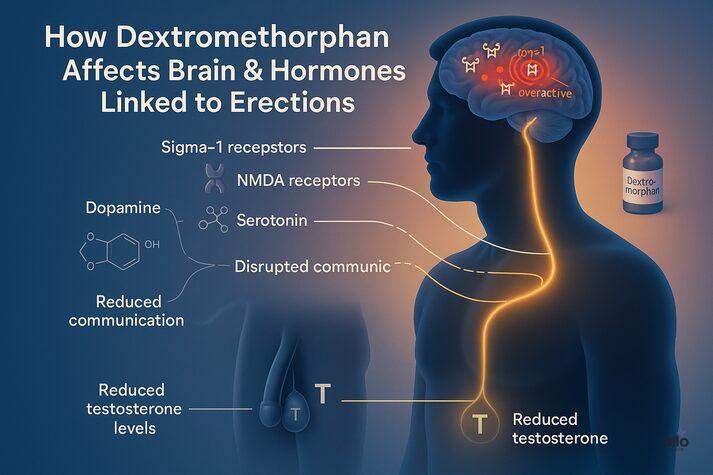
Erectile Dysfunction Due to Misuse of Dextromethorphan
When dextromethorphan is used in normal therapeutic amounts, typically 10–30 mg every 4–12 hours (maximum 120 mg/day), it’s generally safe and does not cause sexual dysfunction.
The problem arises when it’s misused recreationally. [5] Some people use very high doses (300–1500 mg/day) for dissociative or euphoric effects. But this can lead to:
- Severe central nervous system disturbances
- Serotonin syndrome (when combined with antidepressants)
- Neurotoxicity
- Mood dysregulation
- Long-term reproductive function problems
In rare cases, recreational use of dextromethorphan has been linked to psychological ED, where anxiety, hallucinations, or dissociative effects blunt sexual arousal.
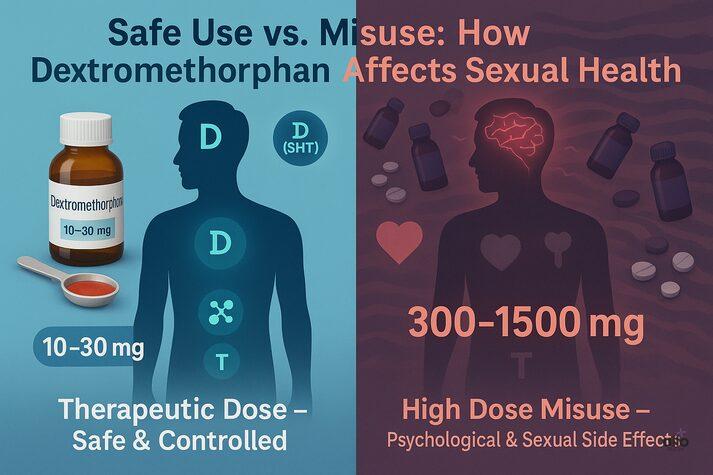
What Makes Dextromethorphan Use Risky?
1. Combining With Certain Antidepressants:
Dextromethorphan can sometimes interact with some antidepressants, which can worsen its side effects.[6] Never combine the following drugs with Dextromethorphan:
- SSRIs / SNRIs
- MAO inhibitors
2. Liver Damage:
Chronic misuse or combination with Chronic use or combination with alcohol, acetaminophen, or methotrexate can increase the risk of liver toxicity and cause liver damage.
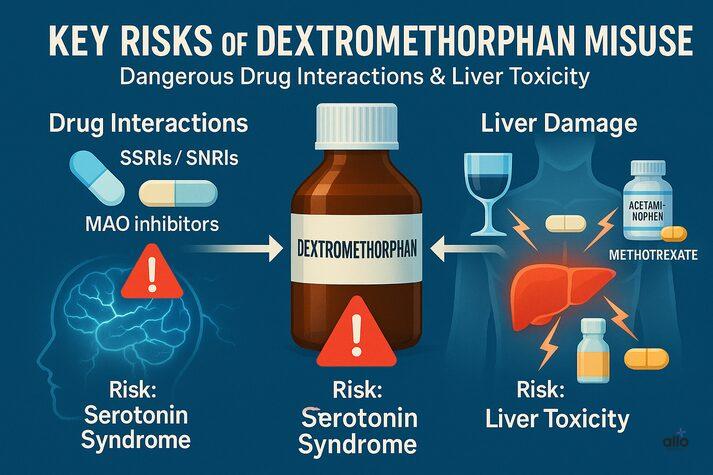
How to Manage ED Caused by Dextromethorphan
If your doctor suspects that dextromethorphan is contributing to ED, management typically involves:
- Dose Adjustment or Discontinuation: ED often improves once the drug is stopped.
- Alternative Medications: Switching to another cough suppressant or an alternative antidepressant.
- Lifestyle Changes: Maintaining a healthy diet, losing weight, exercising, and avoiding alcohol can boost recovery and help with ED.
- Behavioral Therapies: Psychological therapy and support group meetings help manage the psychological effects of drug withdrawal if there is a history of recreational misuse.
- Medical Detox (for misuse or dependence): If someone has been using high doses or has become dependent on dextromethorphan, a supervised medical detox program may be needed. These programs are led by doctors who specialize in addiction recovery and pain management, helping patients safely reduce their drug use and restore normal body function.
- Temporary ED Treatment: ED medications (Viagra, Levitra) can be prescribed if it is safe to use.
If someone’s using high doses of dextromethorphan to feel calm or escape stress, that’s a sign to reach out for help. With proper support, both the physical and sexual side effects can be reversed.
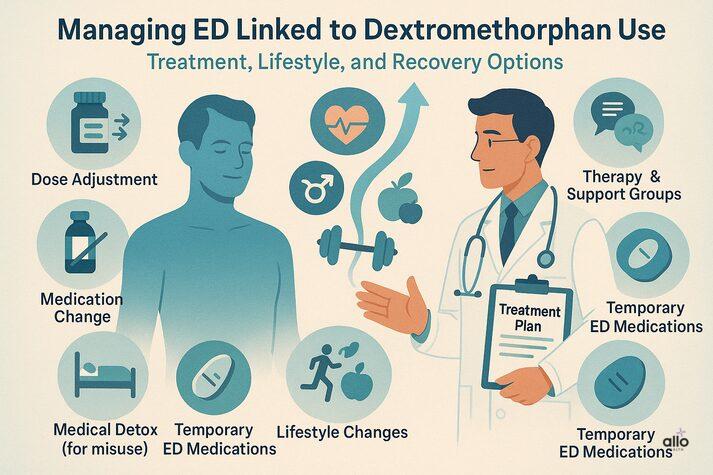
How to Prevent ED Caused by Dextromethorphan
- Use only the recommended dose as per the label or your doctor’s advice.
- Avoid mixing dextromethorphan with antidepressants, alcohol, or illicit drugs.
- Monitor for early side effects like fatigue, mood changes, or decreased libido.
- For individuals using extended-release tablets or long-term prescriptions, periodic liver function and hormone tests are helpful.
- If you have a history of sexual function problems or are taking multiple medications, discuss this with your doctor before starting any new over-the-counter medication.
- Attending therapy or counseling can help prevent misuse of dextromethorphan by addressing underlying stress, anxiety, or emotional triggers that often lead to overuse.
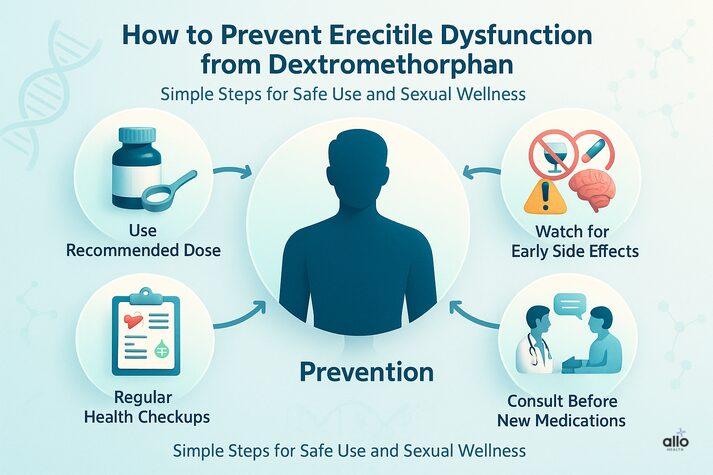
Conclusion
Dextromethorphan is an effective and generally safe cough suppressant when used as directed. But at high doses or when misused, it can lead to erectile dysfunction or other sexual function problems. Fortunately, in most cases, these side effects are temporary and reversible once the drug is discontinued or the dose is adjusted. Used responsibly, dextromethorphan remains a valuable medication, but like any drug, it’s best handled with awareness, moderation, and medical guidance.
"The following blog article provides general information and insights on various topics. However, it is important to note that the information presented is not intended as professional advice in any specific field or area. The content of this blog is for general educational and informational purposes only.
Book consultation
The content should not be interpreted as endorsement, recommendation, or guarantee of any product, service, or information mentioned. Readers are solely responsible for the decisions and actions they take based on the information provided in this blog. It is essential to exercise individual judgment, critical thinking, and personal responsibility when applying or implementing any information or suggestions discussed in the blog."






